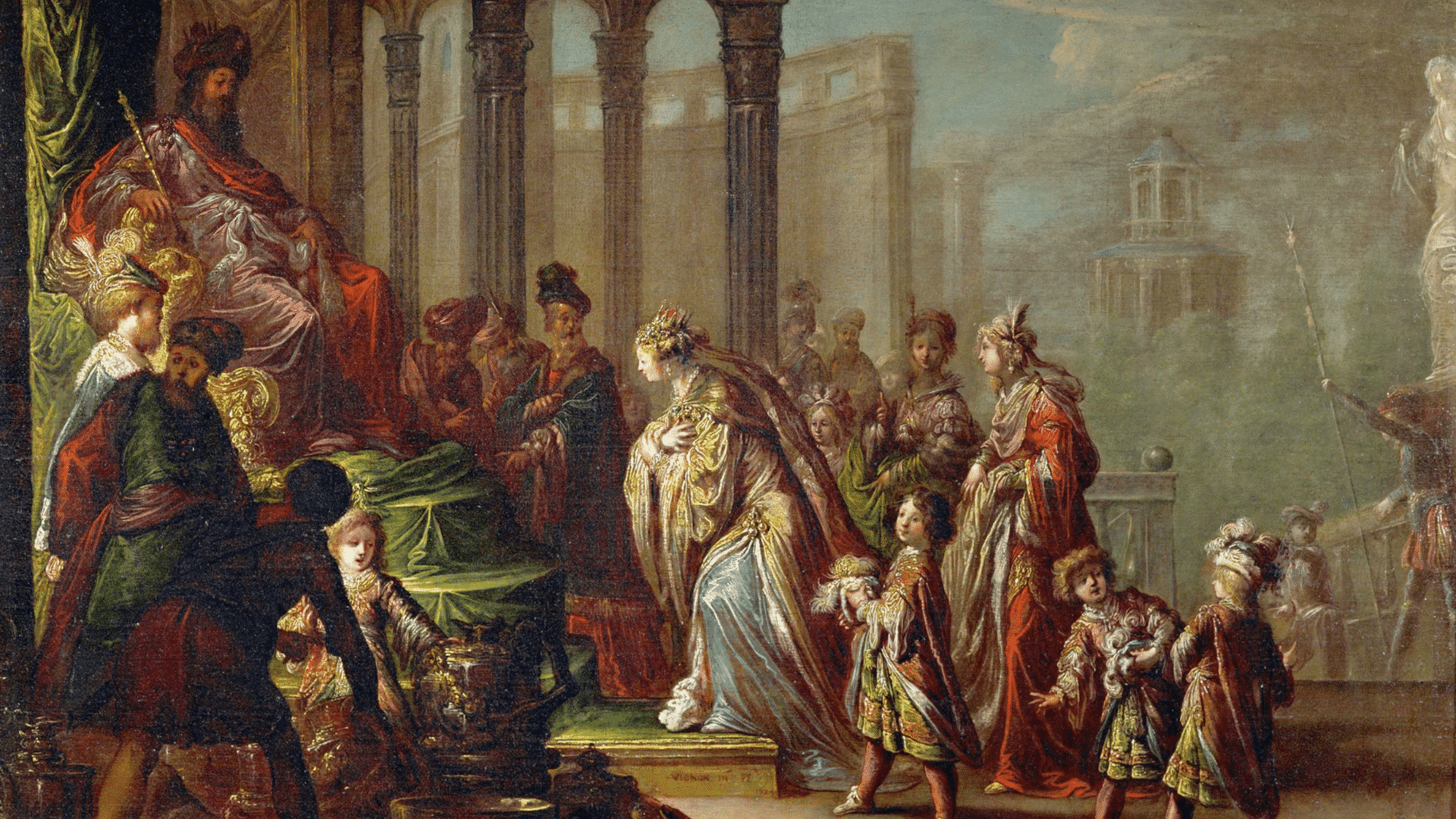King Solomon, also known as Shlomo in Hebrew, ruled Israel in the tenth century BCE during what is often described as the most stable and prosperous era in ancient Israelite history.
He was the son of King David and Bathsheba and inherited a united kingdom with secure borders and strong religious foundations.
Solomon’s reign is remembered for its combination of peace, intellectual achievement, and vast architectural projects, most notably the First Temple in Jerusalem.
Yet, his life was not without contradictions. He was a man of profound insight and ambition, but his later compromises led to political division. His story blends wisdom, wealth, worship, and warning.
Below are some key facts that paint a fuller picture of his complex life and legacy.
Facts That Shaped King Solomon’s Legacy
From legendary wisdom to political controversy, Solomon’s life reflects both spiritual insight and human complexity.
His reign helped shape Israel’s national identity and religious history, but it also planted the seeds of future division.
The following facts delve not only into a king’s accomplishments but also the personal decisions that shaped his reign, and ultimately, Israel’s future.
1. Solomon Was the Son of David and Bathsheba
Solomon was born to King David and Bathsheba in Jerusalem. Though not David’s oldest son, God chose him and publicly anointed him by the prophet Nathan.
His selection over older brothers sparked political tension but marked a divine endorsement. As Bathsheba’s second son, Solomon’s rise symbolized both reconciliation and renewal following David’s earlier failings.
2. He Was the Third King of Israel
Solomon ruled Israel after Saul and David, beginning his reign around 837 BCE. He inherited a united monarchy, a loyal army, and widespread regional influence.
His reign marked a peak in Israel’s political strength and cultural development, often referred to as its golden age.
3. His Name Means Peace
“Solomon” derives from “Shalom,” the Hebrew word for peace. His reign was largely free of war, unlike that of his father, David.
This peaceful environment allowed for major development, trade expansion, and infrastructure projects, including the Temple in Jerusalem.
4. He Asked God for Wisdom Instead of Riches
Early in his reign, God appeared to Solomon in a dream and offered to grant him any request. Solomon asked not for wealth or power, but for wisdom to govern justly.
Pleased with the request, God granted him unmatched wisdom, and, in addition, riches and honor.
5. He Judged the Famous Dispute Between Two Mothers
Solomon resolved a dispute where two women claimed the same baby. He proposed dividing the child, prompting the real mother to plead for the baby’s life.
Her compassion revealed the truth, and Solomon’s wisdom amazed the nation.
6. He Understood the Language of Animals and Birds
According to tradition, Solomon could communicate with animals and birds. Jewish texts suggest he grasped their behavior and messages, symbolizing his deep spiritual and natural awareness.
Claims Include:
- Understanding bird communication
- Reading animal behavior
- Interpreting nature as divine signs
7. The Queen of Sheba Tested His Wisdom
Hearing of his reputation, the Queen of Sheba visited Solomon with riddles to test his famed intellect.
Not only did he answer each question with ease, but his court’s splendor also impressed her deeply. She acknowledged his wisdom as a divine gift and offered lavish gifts in return.
8. He Built the First Temple in Jerusalem
Solomon built the First Temple on Mount Moriah. It took seven years and immense resources. The First Temple was a major religious and architectural achievement:
| Feature | Details |
|---|---|
| Location | Mount Moriah in Jerusalem |
| Completion Year | 827 BCE (2935 from Creation) |
| Duration | 7 years |
| Materials | Stone, cedar, gold, bronze |
| Allies Involved | King Hiram of Tyre |
It became the central site for Jewish worship.
9. He Constructed a Grand Palace and Fortified Cities
Solomon built a massive palace and strengthened cities like Hazor and Megiddo. His infrastructure projects improved national defense and supported a growing population.
Key Projects:
- Royal palace
- City fortifications
- Trade centers
- Military outposts
These showcased administrative strength and long-term planning.
10. He Formed a Strong Alliance with King Hiram of Tyre
Solomon maintained a productive alliance with King Hiram of Tyre, who supplied cedar wood and craftsmen for major building projects.
In exchange, Solomon sent food and agricultural goods. This mutually beneficial relationship strengthened Israel’s regional standing.
This alliance laid the foundation for both temple construction and the development of long-distance trade routes, thereby reinforcing Israel’s economic and diplomatic reach.
11. He Wrote Proverbs, Ecclesiastes, and Song of Songs
Solomon is traditionally credited with three biblical books. Each offers a different voice:
- Proverbs – Practical wisdom
- Ecclesiastes – Philosophical reflections
- Song of Songs – Poetic expression of love
These writings show his intellectual and emotional depth.
12. He Had Many Wives, Some of Whom Worshiped Idols
Solomon’s marriages were politically strategic but spiritually problematic:
- Number of wives: 700 wives, 300 concubines (according to Kings)
- Purpose: Forge alliances with surrounding nations
- Result: Many continued their religious practices, which Solomon tolerated
This led to internal corruption and weakened religious integrity.
13. His Kingdom Declined in His Later Years
Toward the end of his reign:
- Heavy taxes burdened the population
- Forced labor supported building projects
- Public discontent began to grow
These policies, though initially useful, led to instability after his death.
14. The Kingdom Split After His Death
Solomon ruled for 40 years and was succeeded by his son Rehoboam. When Rehoboam rejected a call for lighter policies, ten of the twelve tribes rebelled and formed the northern Kingdom of Israel.
Only Judah and Benjamin remained loyal to the Davidic line, constituting the southern Kingdom of Judah.
| Event | Outcome |
|---|---|
| Rehoboam became king | Continued harsh policies |
| Ten tribes rebelled | Formed the Northern Kingdom (Israel) |
| Two tribes stayed loyal | Formed the Southern Kingdom (Judah) |
15. He Symbolizes a Peaceful Way to Conquer Evil
Solomon’s use of diplomacy and wisdom to manage foreign powers marked a clear departure from the military approaches of his father, David.
His reign emphasized strategic influence and negotiation over direct conflict.
16. He Oversaw a Thriving Trade Network
Solomon capitalized on Israel’s geographic location to build a flourishing trade empire.
He formed maritime expeditions with King Hiram and sent fleets to distant lands like Ophir, returning with gold, precious stones, sandalwood, and exotic animals.
Trade Highlights:
- Ports: Ezion-Geber on the Red Sea
- Goods Imported: Gold, ivory, apes, peacocks
- Partners: Phoenicians, Arabia, possibly East Africa, and India
This trade wealth financed his lavish constructions and enhanced Israel’s global stature.
17. His Wisdom Was Revered Beyond Israel
Solomon’s wisdom was renowned across ancient civilizations. Leaders from distant lands sought his counsel or sent envoys to witness his insight.
His sayings and judgments became part of oral traditions far beyond Israel, influencing neighboring cultures.
Examples of Influence:
- Middle Eastern proverbs with Solomonic themes
- Legends in Islamic, Ethiopian, and Christian traditions
- References in later Greco-Roman literature
His intellect shaped his global legacy not just as a king, but as a sage.
Conclusion
King Solomon’s story is one of grandeur and contradiction. He rose as a wise and peaceful ruler, elevated Israel’s standing through alliances and architecture, and penned timeless reflections on life and love.
Yet his spiritual compromises and harsh governance later in life contributed to the unraveling of his kingdom.
His life teaches that wisdom alone does not ensure success, integrity and humility are equally vital.
Today, Solomon remains a symbol of what is possible when wisdom prevails and a reminder of the consequences that follow when it is ignored.















